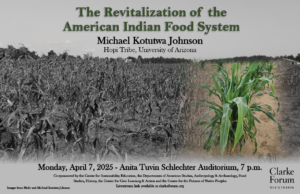 Anita Tuvin Schlechter Auditorium, 7 p.m.
Anita Tuvin Schlechter Auditorium, 7 p.m.
The Revitalization of the American Indian Food System
Michael Kotutwa Johnson, Assistant Professor of Indigenous Resilience at the University of Arizona’s School of Natural Resources and the Environment
Since time immemorial, Indigenous people, like those in the United States, gathered and hunted their own food unimpeded. The crops they grew and wild plants they collected were vital to their survival in the many places where they resided. However, through various federal policies, most American Indian tribes no longer have access to traditional foods and have become almost entirely dependent on federal food programs. As a result, you have higher than usual rates of diabetes, heart disease, and even cancer. For example, a tribe in Arizona has been documented to have the highest rate of diabetes in the Globe. My talk will focus on my research to help develop solutions to the lack of traditional foods by calling for the Revitalization of the American Indian Food System. I will also lay out the cultural aspects demonstrating that these foods are not just viewed as commodities for Indigenous people but an integral part of who they are and the places where they are from. In summary, barriers to moving the call forward for Revitalization must be removed, and I will demonstrate how that can be done, and collaborations can be formed.
This program is sponsored by the Clarke Forum for Contemporary Issues and co-sponsored by the Center for Sustainability Education, the departments of American studies, anthropology & archaeology, food studies, history, the Center for Civic Learning & Action and the Center for the Futures of Native Peoples. This program is part of the Clarke Forum’s Leadership in an Age of Uncertainty Series and it’s annual theme, Alternative Models. In addition, this program was initiated by the Clarke Forum’s student project managers.
Biography (provided by the speaker)
 Michael Kotutwa Johnson is an assistant professor of Indigenous resilience at the University of Arizona’s School of Natural Resources and the Environment and a core faculty member of the Indigenous Resilience Center. His research focuses on Indigenous traditional ecological knowledge and land use management schemes, which can be found in peer-reviewed and featured journal articles. He is a member of the Hopi Tribe and a traditional Hopi dryland farmer. He recently started the Fred Aptvi Foundation, focusing on growing traditional Hopi crops, establishing a seed bank, and developing a Hopi youth agriculture program that includes the Hopi language.
Michael Kotutwa Johnson is an assistant professor of Indigenous resilience at the University of Arizona’s School of Natural Resources and the Environment and a core faculty member of the Indigenous Resilience Center. His research focuses on Indigenous traditional ecological knowledge and land use management schemes, which can be found in peer-reviewed and featured journal articles. He is a member of the Hopi Tribe and a traditional Hopi dryland farmer. He recently started the Fred Aptvi Foundation, focusing on growing traditional Hopi crops, establishing a seed bank, and developing a Hopi youth agriculture program that includes the Hopi language.
Related Links
https://www.instagram.com/dr._hopi_farmer/
https://reasonstobecheerful.world/growing-corn-hopi-dry-farming/
